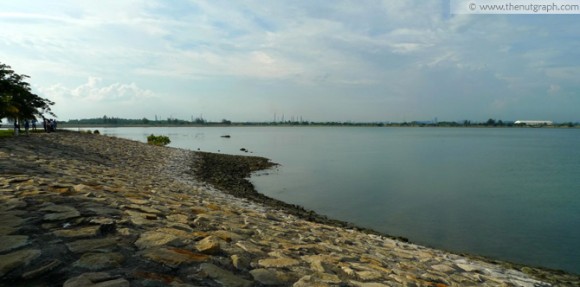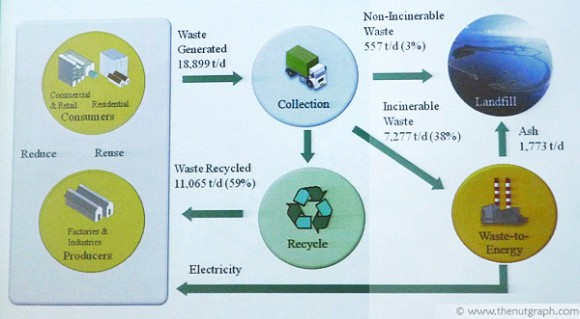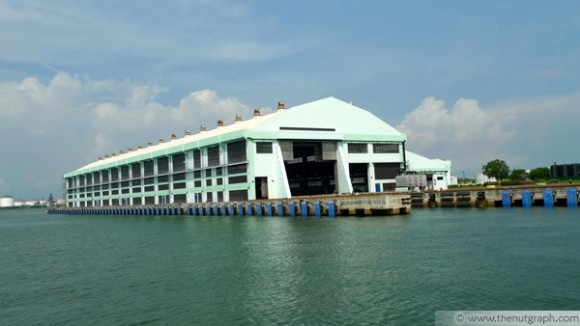THINK of a landfill. What comes to mind? First thing – probably the stink. Toxic leachate seeping out and contaminating waterways. Now, imagine a landfill so clean that people have picnics and take nature walks there. Impossible? Think again.
On a recent visit to Singapore after covering an international conference for National Geographic‘s energy blog, I visited the Republic’s only landfill. Located 30km from the mainland, the Semakau landfill began in 1999 and has become a nature haven for bird-watchers, anglers and marine biologists, as well as astronomers.
“The environment is so clean that nature is able to survive and thrive [here],” senior manager Ivan Yap proudly told visitors during a tour on 4 July 2012. Indeed, 66 bird species and 17 fish species have been found in and around the landfill. Visitors can also marvel at exposed mangroves, coral reefs and starfish along the coastline during low tide.
As the island is free from light pollution, the Astronomical Society of Singapore carries out stargazing activities on it.
How did Singapore manage this? And what lessons can Malaysians learn from our neighbour to improve our waste-management system?

An engineering marvel
Due to land scarcity, Singapore closed its last landfill on the mainland in 1999 and spent S$610 million (approximately RM1.5 billion) to construct the Semakau landfill in the ocean.
The offshore landfill is made up of the Semakau Island, Sakeng Island and a 7km rock bund that encloses a part of the sea off the two islands. According to Yap, the rock bund is lined with impermeable membrane and marine clay, a material commonly found in the sea bed, to prevent any leachate from contaminating the sea. Monthly checks are done to ensure there is no leakage, he said.
Singapore has four incinerator plants and burns almost all its trash to reduce the volume of waste by at least 90%. It then ships the ash and non-incinerable waste, such as construction debris and treated sludge from factories, to the 350-hectare landfill.
“We don’t receive organic waste, that’s why the landfill doesn’t stink,” Yap explained.

Nevertheless, the landfill’s general manager, Ong Chong Peng, said there are four dry cells and a small leachate treatment plant in case they have to receive food waste.
The landfill has received over 10 million tonnes of ash and waste since 1999 and is expected to last at least another 33 years.
Ong said the recycling rate in Singapore is around 59% and the country aims to shore it up to 65% by 2020 and 70% by 2030 to prolong the life of their only landfill.
Separate, burn then bury
Malaysia has been slow to adopt incinerators, with most of our states still relying entirely on landfills to bury our trash. Not all of our dumpsites are equipped with proper facilities to treat landfill gas and leachate.
We also don’t segregate our household waste. Our recycling rate is dismally low at about 11%. The federal government aims to increase this to only 40% by 2020. Paradoxically, it also aims to become an advanced nation capable of managing our resources efficiently by 2020. This would hardly be the case if we’re still wasting valuable resources and precious landfill space by dumping more than half of our recyclable items into landfills.
Our political leaders need to snap to their senses. We don’t have an infinite amount of land to bury our household waste, which is increasing at an annual rate of around two percent. The people in Selangor and Kuala Lumpur throw out an average of 7,375 tonnes of garbage – the equivalent of about 1,400 Borneo pygmy elephants – a day.
The federal government’s move to provide separate bins for organic waste is a good start.

We should be aggressively emulating not just Singapore but cities like Malmo in Sweden, which use their food waste to produce biogas to power the buses in their city.
Malmo also recycles close to 98% of its household waste. Their municipal waste company provides separate, clearly labelled bins for not just glass, paper, cardboard, metal and plastic, but for batteries as well.
If anything, Singapore and Malmo have demonstrated that it is possible to manage waste more creatively. Stinky, polluting landfills need not be the norm. Malaysia already has an increasingly eco-conscious populace, all we need now is political will. ![]()
Gan Pei Ling believes Malaysia is capable of outdoing Singapore and Sweden to become a more sustainable nation.


Kong Kek Kuat says
@ Gan Pei Ling
“Gan Pei Ling believes Malaysia is capable of outdoing Singapore and Sweden to become a more sustainable nation.”
Hahaha…
Pei Ling says
What was so funny about that statement? The only reason I’ve not migrated, like many of my peers are planning to, is because I still have some faith in this country.
I sound like a broken record but Malaysia is blessed with many natural resources. Unlike Singapore, we’re capable of becoming a self-sufficient nation when it comes to food, water, energy and more. What we lack is good governance but, fortunately we still have some good, humble people who refuse to give up on this country and are toiling quietly to whip it back into shape.
Why drown in disillusionment and negative mockery when one can be contributing to the good fight?
Kong Kek Kuat says
@ Pei Ling
Ooo… sensitive. I apologise. I thought you were joking.
Well, we all have dreams, don´t we? While yours is hoping/dreaming that Malaysia will outdo countries such as Singapore and Sweden, my hope/dream is for Malaysia to outdo the Malaysia of the past. And I have sinful thoughts too — I often fantasise quite clearly in my mind that Malaysia will outdo Singapore, of course.
Pei Ling says
You thought I was joking because you’ve almost lost faith in this country, no? I believe we can outdo any country and this Malaysia of the past that you speak of if our citizens set our minds to.
It is the citizens who will have to turn this country around, not the politicians. The problem with some of us is we tend to blame the political parties, civil service etc for the country’s woes. If Malaysia is not where we want it to be today, all of us young and old are responsible.
Not that we should stop holding the powers-that-be accountable. But as citizens we should be doing everything we can to relentlessly lift this country up to our standards.
Marc says
Sorry, but I’m going to be a stick in the mud as well. It’s been a day since this article was published, but there’s maybe, like…5 comments? This shows that the majority of Malaysians really don’t give a toss. As with most people, Malaysians need to be spoon fed, hence actually PROVIDING the facilities to recycle and compost easily is important. For example, in Australia, recycling increased when municipals started providing bins in which people can throw ALL their recyclables instead of having to sort it out (ie. paper, plastic, glass).
I do admire your hope and faith in Malaysia, but being an oil-rich and resource-rich nation has made us a lazy nation, relying on the money and flippantly spending it on projects that don’t really matter. What needs to be cleaned up first is our political system, because with all the bureaucracy standing in the way of progress, the environment is just going to take a backseat.
Just a small example: I know someone who was involved in bringing in a technology that easily composts all sorts of organic waste (meat, fish etc. included) into organic compost using enzymes. It was presented to all the waste management companies and it’s been 8 years, and nothing has happened. Only one hotel that I know of has adopted it as part of their waste management. Reasons given by waste management companies? Government won’t give the grant and what we’re doing now is just fine.
Moral? FAST progress happens when people who do make the big decisions to spend RM1b on proper waste management is what will make the difference.
Kong Kek Kuat says
@ Pei Ling
I thought you were joking because I thought that was the mildest form of sarcasm, not that I´ve not already lost faith in this country. I´m sorry, I don´t drown in delusional optimism or optimistic delusion. I don´t know how to put it to you in the most polite form, but simplistic thoughts are just that — simple, for simplistic people.
The next thing some people here are going to tell me is that even Tony Fernandes has said that we can achieve anything if we set our minds to it. Well, then I´m sure only Mr. Fernandes in this current world of aviation knows how to set his mind to achieve success. I guess the rest of the others in the aviation world are stupid for not being able to set their minds to achieve success? Hahaha… *rolling my head*.
Pei Ling says
@ Kong Kek Kuat
I’m glad to hear I’ve been mistaken in thinking you’ve lost faith in the country. Just to make myself clear why I didn’t find your joke funny, it’s for the same reason I wouldn’t laugh if someone from other developing countries like India or Thailand made a similar statement.
P/S: If I were to quote anyone on the importance of faith and persistence in achieving long-term goals, I would prefer to quote Gandhi or journalist Lasantha Wickrematunge over Tony Fernandes, anytime.
Jacqueline Ann Surin says
In Holland, people separate their organic waste and the local councils make compost out of the organic waste they collect from households. The compost is then sold to nurseries and farms.
Mohd Fairiz says
I think Copenhagen comes out tops when it concerns turning trash into energy. Here they turn it into some major public attraction as well and it looks amazing! http://www.dezeen.com/2011/01/27/waste-to-energy-plant-by-big/
JW Tan says
It’s possible – but the government needs to help, and influence the populace to do so. Things like recycling boxes, proper planning codes, regular rubbish collection all nudge people in the right direction. Unfortunately in Malaysia if one depends on BN and the civil service to do anything, not only won’t it get done, but someone makes money out of it anyway.
trashbuster says
Do mull over these two write-ups:
http://ecowarriorz.blogspot.com/2011/12/privatisation-or-piratisation.html
http://sampahman.blogspot.com/2010/12/today-i-am-proud-to-be-malaysian.html
lily says
I think the mentality of Malaysians needs to change. Yes, we know of recycling and we understand the dangers of wastage. But are we willing to change the way we live?
In response to Marc, the govt has currently awarded three waste management companies a concession to handle solid waste collection in this country. One of their first KPIs was to introduce new bins and a new collection system, similar to those in developed countries. The new bins are there to encourage the public to separate their waste (recyclables in one and solid waste in another) and the collection system will follow suit (recyclables once a week and solid waste twice a week).
And I agree that our government, our country, is a little slow on this. Only when we’re at the end of our rope will they start to see the seriousness of the issue.